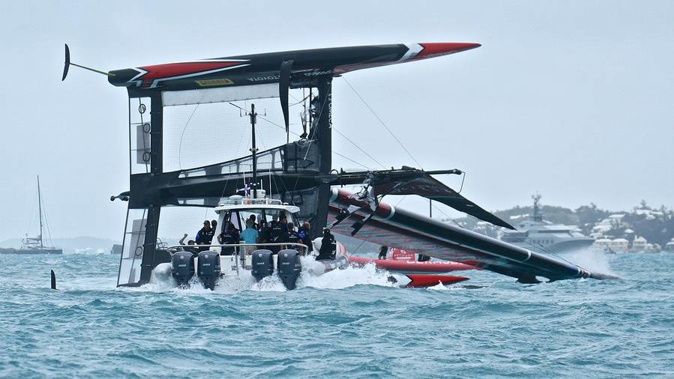
Team New Zealand's decision to drop foiling catamarans has the backing of a leading America's Cup designer.
Britain's Andy Claughton, writing in Seahorse magazine, believed the cats would not have been able to be safely raced in the Hauraki Gulf.
The foiling catamarans were immensely complicated, expensive, and time consuming to maintain, he said.
"This is OK for a racing car, where everyone knows that when you look under the bonnet of a modern car, you have no idea what is going on but you know it's cool and clever, and reassuringly expensive. But for a racing yacht none of this complication seems appropriate.
"Our sport is about challenging wind, wave, and tide, and this of itself is complication enough. If you add in 30 hydraulic actuators and half a million lines of computer code, does this add it the spectacle?
"The boats were miserable to sail for two-thirds of the crew, slaving over the pumps to keep the hydraulic fluid flowing. For the helmsman and wing trimmer it was heart in the mouth stuff as the penalty for a small error was a race loss, and in winds over 20 knots, even in the Great Sound, there was a real risk of serious injury if anything went wrong.
READ MORE: The Warehouse owner Stephen Tindall taking tie off to focus on America's Cup
"These boats could not be safely raced in the Hauraki Gulf, Newport, Rhode Island or the Solent - just the sort of places the Deed of Gift envisaged."
Claughton was chief technology officer with Ben Ainslie Racing during the Bermuda America's Cup and was a research and design co-ordinator with Team New Zealand from 2000 to 2007.
The 50-foot catamarans became basically slave ships with the amount of work needed to power them. He also felt they were too risky, even for the more favourable conditions of the Great Sound.
The buildup to Bermuda was plagued by capsizes and damage among the six competing syndicates, with Emirates Team New Zealand pitch-poling in the challenger semifinals. Luckily, no one was injured in the incident.
Team New Zealand will release more details on November 30 of the 75-foot monohulls they will introduce, with the class rule set to be published on March 31 next year.
Reintroduction of monohulls has already brought one of the most storied clubs, the New York Yacht Club, back into the Cup, due to be sailed off Auckland in 2021.
Take your Radio, Podcasts and Music with you









